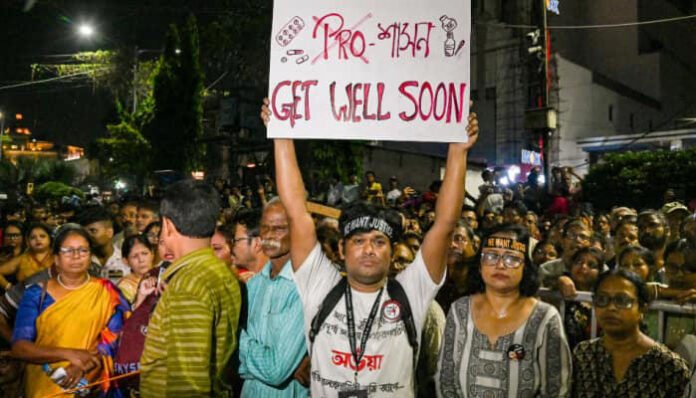The ongoing protests by junior doctors at RG Kar Medical College and Hospital in Kolkata have reached a critical juncture as their health deteriorates amidst a relentless hunger strike. The protests, which began several days ago, are in response to the West Bengal government’s silence on a series of demands aimed at improving working conditions, safety, and adequate resources for healthcare professionals. As the situation escalates, concerns are growing not just for the well-being of the protesting medics but also for the healthcare services in the state.
Background of the Protests
The junior doctors at RG Kar Medical College initiated their protests to highlight several pressing issues that have long plagued the healthcare system in West Bengal. Among their demands are better working conditions, increased security measures in hospitals, and timely payment of salaries. The medical community has voiced concerns about incidents of violence against healthcare professionals, which they argue is a result of inadequate safety protocols and the lack of support from the government.
The situation took a turn for the worse when the protesting doctors decided to go on a hunger strike. This drastic measure was intended to draw attention to their plight and the urgent need for action from the state government. As days passed without any substantive response from the authorities, the health of the fasting doctors began to deteriorate, raising alarm among their colleagues and supporters.
Deteriorating Health of Fasting Medics
Reports from the protest site indicate that several junior doctors have begun to show signs of severe fatigue and health complications due to prolonged fasting. Despite the critical state of their health, the protesting medics remain resolute in their demands, emphasizing that they are fighting for better working conditions not only for themselves but for the entire healthcare system in Bengal.
The hunger strike has drawn significant attention from various quarters, including student organizations, medical associations, and civil rights groups. Supporters have been rallying outside the hospital, urging the government to take immediate action to address the doctors’ grievances. As their health worsens, calls for the government to intervene and negotiate with the protesting doctors have intensified.
Government’s Response and Inaction
Despite the growing crisis, the West Bengal government has remained largely silent on the demands put forth by the junior doctors. The lack of communication from the authorities has frustrated the medical community and sparked outrage among the public. Critics argue that the government’s inaction reflects a broader pattern of neglect towards the healthcare system, which has been exacerbated by the COVID-19 pandemic.
Political leaders and health activists have expressed their disappointment with the government’s response, emphasizing that junior doctors play a crucial role in the healthcare system. They argue that the government’s failure to address their concerns undermines the morale of healthcare professionals and jeopardizes patient care.
Many have called for an immediate dialogue between the junior doctors and government officials to address the issues at hand. The protests have reignited discussions about the need for comprehensive healthcare reforms in the state, highlighting the challenges faced by healthcare workers in an increasingly strained system.
Public Support and Solidarity
As the protests continue, public support for the junior doctors has been growing. Social media campaigns, demonstrations, and petitions have emerged, with many citizens expressing solidarity with the medics. The hashtag #StandWithJuniorDoctors has been trending, amplifying calls for the government to take action.
This solidarity has been crucial for the protesting doctors, as it not only bolsters their morale but also serves as a reminder of the public’s recognition of their sacrifices and contributions. Many in the public view the junior doctors’ struggle as indicative of larger systemic issues within the healthcare system, resonating with their own experiences of inadequate medical facilities and care.
The Path Forward
As the hunger strike continues and the health of the protesting doctors deteriorates, the need for urgent intervention becomes increasingly critical. The West Bengal government must recognize the importance of engaging with the junior doctors and addressing their legitimate concerns to restore faith in the healthcare system.
The ongoing protests at RG Kar Medical College and Hospital serve as a reminder of the challenges faced by healthcare workers in India. As the medical community fights for its rights and the welfare of patients, it is imperative for the government to prioritize the well-being of both healthcare professionals and the public they serve.
In addition, the RG Kar protests highlight the urgent need for dialogue and reform within the healthcare system in West Bengal. The junior doctors’ steadfast commitment to their cause, even in the face of deteriorating health, underscores the critical importance of addressing the systemic issues plaguing the sector. As the situation unfolds, the hope remains that the government will take meaningful steps to engage with the protesting medics and ensure a safer, more equitable healthcare environment for all.

